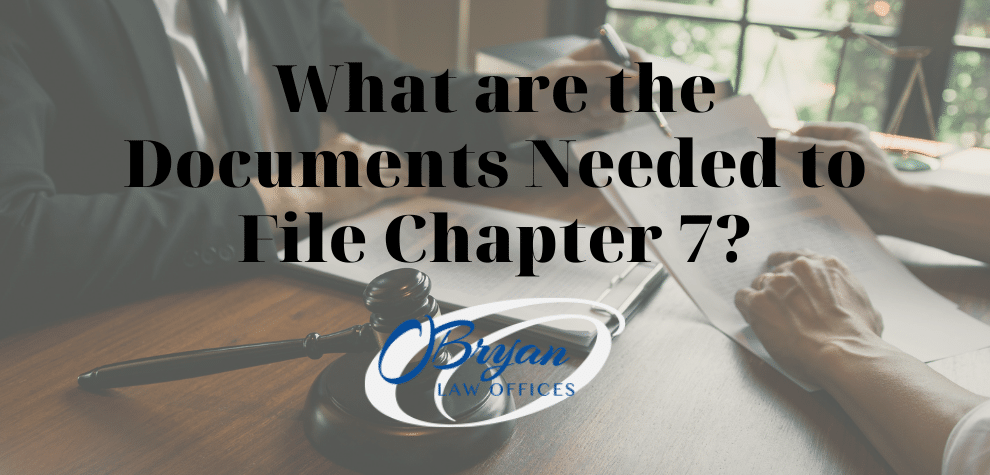To file for Chapter 7 bankruptcy in Kentucky, you’ll need several key documents that show your finances and confirm your eligibility:
- Tax Returns
- Income Documentation
- Mortgage Statements and Proof of Real Estate Fair Market Value
- Vehicle Registration, Proof of Value, and Insurance
- Financial Records
- Identification
- Proof of Alimony or Child Support
- Credits and Debts
- List of Assets
- Monthly Expenses
- Legal Records
- Proof of Credit Counseling
Collecting the right paperwork for bankruptcy can be stressful, but an experienced Louisville bankruptcy lawyer can guide you through every step. Call O’Bryan Law at (502) 339-0222 for a free consultation and personalized help with your Chapter 7 filing.
What is Chapter 7 Bankruptcy?
Chapter 7 bankruptcy, often called “liquidation bankruptcy,” is designed to help individuals start fresh by eliminating unsecured debts such as credit card balances, medical bills, and personal loans. It takes its name from the section of the federal bankruptcy code where it is described. For many people in a Kentucky bankruptcy case, Chapter 7 offers the most complete form of financial relief.
The main purpose of Chapter 7 is to discharge debts you cannot realistically repay, allowing you to rebuild your financial stability. In most cases, a court-appointed trustee reviews your assets and may sell non-exempt property to repay creditors, although many filers keep most or all of their belongings under exemption laws. Once the process is complete, you are no longer legally required to pay discharged debts.
Here’s a quick overview of the Chapter 7 process:
- Filing a petition with the bankruptcy court and submitting the required financial documents.
- Attending the meeting of creditors, where the trustee and any creditors can ask questions about your finances.
- Receiving a discharge order, which wipes out eligible debts once all legal requirements are met.
Essential Documents for a Chapter 7 Filing

Filing for Chapter 7 bankruptcy requires collecting detailed paperwork that gives the court and trustee a full picture of your financial situation. This includes information about your income, debts, assets, monthly expenses, and recent financial activity. Being thorough and organized with these documents is essential if you want to file for bankruptcy smoothly and avoid unnecessary setbacks.
Having everything ready before you file is one of the best ways to keep the process on track. Below is a list of the key documents you should gather and prepare for your Chapter 7 filing.
Tax Returns
In Chapter 7, most bankruptcy trustees will ask for at least two years of tax returns because they verify your income. However, if someone is filing for Chapter 13 bankruptcy, trustees require four years’ worth of tax returns. If you failed to file taxes in the last two years, your trustee will require you to file and then provide copies.
Income Documentation
On top of tax returns, you will also need copies of pay stubs and your last two W-2 to verify your income. If you receive income from other sources such as Social Security funds, disability, or rental properties, you must provide proof of those as well.
Mortgage Statements and Proof of Real Estate Fair Market Value
If you own real estate, you must show proof of your property’s fair market value. Depending on the amount of equity or district guidelines, you can choose online valuation, a broker’s price opinion, or a full appraisal.
Additionally, you need to provide mortgage statements that show current loans and payments. Some trustees may ask you for the deed of trust and your home insurance as well.
Vehicle Registration, Proof of Value, and Insurance
Bankruptcy trustees will also require proof of ownership for any cars you own, along with proof of your car’s value. Similarly to mortgage statements, you will also have to provide a recent loan statement if you have a car loan. The loan statement needs to show how much you owe and how much you’re paying monthly. Some trustees will also ask for a copy of your registration and proof of insurance.
Financial Records
Possibly the most important documents needed to file Chapter 7 are your financial records, so that you can prove that you can’t pay your bills. Courts also want to make sure you’re not hiding money that you could use to pay off debt. Make sure to bring copies of:
- Bank statements from the last few months
- Most recent bills from creditors
- Bills or invoices for large payments from the last year
Receipts - Retirement statements
- Documentation that someone owes you money, and the payments they’re making to you
Identification
Another important part of filing for bankruptcy is to prove your identity. Your trustee will likely request your driver’s license, Social Security number, and other supporting forms to verify your information. Providing these documents promptly helps bankruptcy clients ensure their case proceeds smoothly.
Need help gathering your identification and other essential documents? Call a trusted Louisville bankruptcy lawyer at O’Bryan Law at (502) 339-0222 for a free consultation and step-by-step guidance to keep your Chapter 7 case on track.
Proof of Alimony or Child Support
Alimony or child support payments can be a significant cause of overwhelming debt and, therefore, an inability to pay off debt. Because of this, you will need to provide proof of alimony and child support payments. A certified copy of your court order will do the job.
Credits and Debts
Other crucial documents needed to file Chapter 7 are proof that you’re in debt. This means you need to show proof of debts from medical bills, student loans, credit cards, and more. Your trustee will notify your creditors of the bankruptcy proceedings, and you will be able to represent yourself. That means the court will need to know who your creditors are and how much you owe them in order to proceed.
List of Assets
In Chapter 7 bankruptcy, you must sell many of your assets in order to pay off your debts. Because of this, you need to be transparent about your current valuable assets to your trustee. In Kentucky, you can keep up to $3,000 worth of household assets like furniture, jewelry, clothes, and more. But in Ohio, you can keep $12,625 worth of household items as long as each singular item is worth less than $600.
Monthly Expenses
A bankruptcy trustee may also ask for a list of your monthly expenses such as groceries, rent, subscriptions, and more. This information can help courts decide whether or not you can pay off your debts.
Legal Records
If you have a bankruptcy attorney on your side, you will need to provide documentation of any legal history or pending litigation. Additionally, any pending litigation or current court order will help trustees determine how much you can afford to pay creditors.
Proof of Credit Counselling
Lastly, you must provide proof of credit counselling before your case can be filed. Under the 2005 Bankruptcy Act, this pre-filing course—completed within 180 days of submitting your petition—teaches you to assess your finances and explore alternatives. After filing, you’ll also need to take a debtor education or financial management course before the court can discharge your debts. A bankruptcy attorney can help ensure you complete both courses correctly so you can meet legal requirements and stay debt-free after Chapter 7.
What Additional Documents Does a Trustee Need for Chapter 7?

Confident mature businessman with paper discussing financial points or data with his two subordinates.
On top of all of the necessary paperwork to file for Chapter 7, trustees also need specific documentation to investigate your bankruptcy filing. For example, your trustee may request:
- Profit and loss statements and proof of liability insurance if you own a business
- Pictures and approximate values of your rare and antique items
- A marital settlement agreement or divorce order, if applicable
What Forms Are Required to File Bankruptcy in Chapter 7?
After gathering all supporting documents to file and providing any additional items requested by the trustee, the next step in a Kentucky bankruptcy is completing the official Chapter 7 forms. These forms organize your personal and financial details into a standardized format for the court and trustee to review, making it possible to file a bankruptcy successfully.
Key forms typically include:
- Voluntary Petition (Form 101) – Officially opens your case and provides basic identifying details.
- Schedules A–J – List your property, debts, income, expenses, and other essential financial data.
- Statement of Financial Affairs (Form 107) – Outlines your recent financial activity and background.
- Declaration (Form 119) – Certifies under penalty of perjury that your information is complete and accurate.
Kentucky-Specific Rules and Local Filing Requirements
After completing the official Chapter 7 forms, you must follow rules and procedures unique to Kentucky. While federal bankruptcy laws are the same nationwide, Kentucky has its own exemptions, filing requirements, and district-specific guidelines. Filing correctly can help you avoid mistakes, protect your property, and stay on schedule.
Key things to know for filing in Kentucky:
- You can protect up to $3,000 in household assets like furniture, clothing, and jewelry, though exemptions vary by district.
- Filing fees, accepted payment methods, and deadlines differ depending on your local bankruptcy court.
- You must attend a meeting of creditors with your trustee. Working with a Louisville bankruptcy lawyer can help you navigate exemptions, court protocols, and deadlines. Many attorneys offer phone consultations, so you can get guidance without leaving home.
What Documents do Trustees Need After Filing for Chapter 7?
Once you finish filing for Chapter 7 bankruptcy, you must provide even more paperwork because the court will need verification that the information in your petition is accurate. Here’s a list of paperwork you’ll need after filing for Chapter 7:
- 60 days of paycheck stubs or other proof of income from your employer
- The most recently filed tax return
- 60 days of bank statements
- A debtor’s education course completion certificate
- Paperwork showing that you’ve hired a bankruptcy attorney
This paperwork is due at least seven days before your 341 meeting (also called the creditors’ meeting), which all bankrupt people must attend. It’s best to submit this paperwork as soon as possible because:
- Some trustees reward those who submit paperwork early by hearing their cases first. Trustees will likely meet with late paperwork submitters last.
- Your trustee can handle any issues that arise in your bankruptcy process quickly and smoothly when you get ahead of the game. Resolving issues before the 341 meeting is key to avoiding a continuance and prevent unnecessary delays.
What if I Lose Documents in a Natural Disaster?
This may sound like a random scenario that doesn’t need a second thought; however, filing for bankruptcy following a natural disaster is very common. Not only are jobs and property lost during a natural disaster, but the documents needed to file Chapter 7 are lost, too. Luckily, bankruptcy trustees prepare for situations like this. When a bankrupt person loses their paperwork, a trustee will:
- Avoid taking action against a bankrupt person who can’t provide the necessary documents
- Grant reasonable requests to ease filing requirements
- Consider a decrease in income or an increase in expenses
What Are the Common Mistakes When Filing Chapter 7?
Even with all the right legal documents prepared, many people make avoidable errors that can slow down or even derail their Kentucky bankruptcy case. Missing signatures on your bankruptcy petition, filing in the wrong local bankruptcy court, or submitting paperwork late can lead to delays or dismissal. Being dishonest or omitting information is especially risky—it can jeopardize your debt relief or even result in legal penalties.
Some frequent mistakes include:
- Forgetting to sign required forms or schedules
- Filing in the wrong jurisdiction or local bankruptcy court
- Missing filing deadlines
- Leaving out required financial details in the bankruptcy petition
- Providing inaccurate or false information
Avoiding these pitfalls is key to making the process as smooth as possible.
Call a Bankruptcy Attorney Today
Filing for bankruptcy is already complicated, and gathering the documents needed to file Chapter 7 can be overwhelming. Whether you’re filing for Chapter 13, Chapter 7, LLC bankruptcy, or simply need help organizing your paperwork, our experienced bankruptcy attorney can guide you step by step and provide a comprehensive bankruptcy checklist to keep everything on track. O’Bryan Law has offices in Louisville, Frankfort, and New Albany—contact us at (502) 339-0222 for a free consultation.
FAQs
How does the automatic stay protect you?
When you file a bankruptcy petition, the court issues an automatic stay that stops most creditor actions immediately. This includes halting wage garnishments, foreclosure, repossessions, collection calls, and certain lawsuits—giving you breathing room to work with your bankruptcy attorney.
What legal risks should you be aware of when filing for bankruptcy?
Providing false information, omitting assets, or not following local bankruptcy court rules can result in fines, dismissal of your case, or even criminal charges. Always ensure your legal documents are complete and accurate.
What Are the Chapter 7 Tax Return Requirements?
When filing for Chapter 7 bankruptcy, you must submit copies of your most recent federal and state tax returns to your trustee—usually for the past two years. These Chapter 7 tax return requirements allow the trustee to verify your reported income, identify potential assets, and ensure compliance with bankruptcy rules. Failing to provide accurate tax returns can delay your case or result in dismissal.
Why is documenting recent financial transactions important?
You must disclose significant transactions from the past two years—such as asset transfers, large payments, or new debts—so the trustee can determine if any should be reversed for creditor benefit.
What is the difference between exempt and non-exempt property?
Exempt property (like certain household goods or retirement accounts) is protected, while non-exempt property may be sold to pay creditors. The trustee will also review collateralized debts, such as mortgages or car loans, to assess what can be kept.
How does the means test affect whether I file Chapter 7 or Chapter 13?
The means test compares your income to the Kentucky state median to determine eligibility for Chapter 7. If your income exceeds the median, additional calculations are applied to see whether you must file Chapter 13 instead. This test ensures that Chapter 7 and Chapter 13 filings align with your financial ability to repay creditors.


